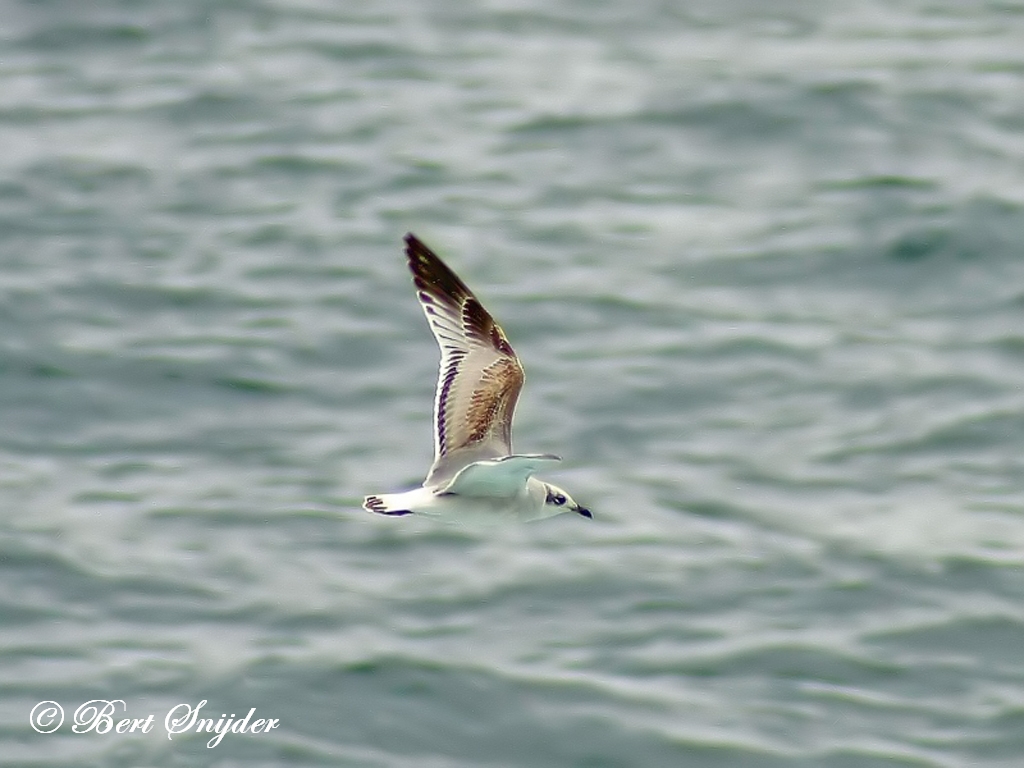Mediterranean Gull, Zwartkopmeeuw, Schwarzkopmöwe, Gaivota-de-cabeça-preta, Gaivota Cabecinegra
Spotted near Sines in the Alentejo region of Portugal. Mediterranean Gull sound
The Mediterranean Gull, Ichthyaetus melanocephalus, is a small gull which breeds almost entirely in the Western Palearctic, mainly in the south east, especially around the Black Sea, and in central Turkey. There are colonies elsewhere in southern Europe, and this species has undergone a dramatic range expansion in recent decades. Birders often abbreviate its name to “Med Gull”. As is the case with many gulls, it has traditionally been placed in the genus Larus.

The Mediterranean Gull is slightly larger and bulkier than the Black-headed Gull with a heavier bill and longer, darker legs. The breeding plumage adult is a distinctive white gull, with a very pale grey mantle and wings with white primary feathers, with a black hood contrasting with distinct white eye crescents. The blunt tipped, parallel sided, dark red bill has a black subterminal band. The non breeding adult is similar but the hood is reduced to an extensive dusky “bandit” mask through the eye. This bird takes two years to reach maturity. First year birds have a black terminal tail band and more black areas in the upperwings, but have pale underwings.
Formerly restricted to the Black Sea and the eastern Mediterranean this species has now expanded over most of Europe as far as the Great Britain and Ireland, with 37 sites: 543–592 pairs in the United Kingdom in 2008. In Ireland breeding has been recorded in at least four counties. Breeding has also occurred in Belgium, Netherlands, Denmark, Sweden, Estonia, Switzerland, the Czech Republic, Hungary and the Balkans.
In winter, this bird migrates to Mediterranean and Atlantic coasts.
This gull breeds in colonies in large reedbeds or marshes, or on islands in lakes; where its population is small, it nests in Black-headed Gull colonies. Like most gulls, it is highly gregarious in winter, both when feeding or in evening roosts. It is not a pelagic species, and is rarely seen at sea far from coasts.
The Mediterranean Gull’s feeding habits are much an opportunistic omnivore, eating fish, worms, scraps, insects, offal and carrion.
This is a noisy species, especially at colonies, with a nasal “yeah” call.
Other synonyms:
Asturian: Gavilueta Tiesta Prieta, Gaviota Tiestaprieta
Breton: Ar gouelanig penn du
Catalan: Gavina capnegra
Catalan (Balears): Gavina capnegra
Czech: Racek cernohlavý, racek èernohlavý
Welsh: Gwylan Mor y Canoldir, Gwylan Môr y Canoldir
Danish: Sorthovedet måge
German: Schwarzkopfmöve, Schwarzkopfmöwe
English: Mediterranean Black-headed Gull, Mediterranean Gull
Esperanto: nigrakapa mevo
Spanish: Gaviota Cabecinegra, Gaviota Mediterránea
Estonian: Karbuskajakas, Karbuskajakas e. mustpea-kajakas, Karbuskajakas, mustapea-kajakas, mustapea-kajakas
Basque: Antxeta burubeltza, Gavina capnegra
Finnish: Mustanmerenlokki
Faroese: Høvuðsvartur mási
French: Mouette mélanocéphale
Irish: Sléibhín Meánmhuirí
Galician: Gaivota cabecinegra, Gavina capnegra
Croatian: Crnoglavi Galeb
Hungarian: Szerecsensirály
Icelandic: Lónamáfur
Italian: Gabbiano corallino
Japanese: nishizugurokamome
Latin: Ichthyaetus melanocephalus, Larus melanocephalus
Lithuanian: Juodagalvis kiras
Latvian: Melngalvas kaija
Maltese: Gawwija Rasha Sewda
Dutch: Zwartkopmeeuw
Norwegian: Svartehavsmåke
Polish: mewa czarnoglowa, Mewa orlica
Portuguese: gaivota do mediterrâneo, Gaivota-de-cabeça-preta, Gaivota-do-mediterrâneo
Romansh: Muetta dal chau nair
Russian: Chernogolovaya Chayka
Slovenian: crnoglavi galeb
Albanian: Pulëbardha kokëzezë
Serbian: crnoglavi galeb
Swedish: Svarthuvad mås
Turkish: Akdeniz martysy
Travel Birdwatching Holiday Alentejo, Vacation Portugal for birders. Guided Birdwatching Tours and Trips.